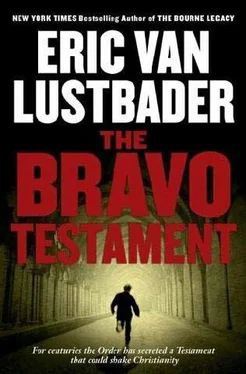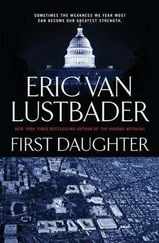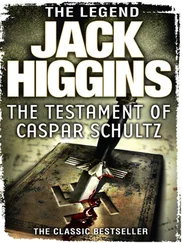"We were all tore up when we heard of Mr. Shaw's untimely passing. Everybody in the building liked him. He was quiet, you know, kept to himself-but friendly all the time."
My father, the politician, always honing his image, Bravo thought as he thanked the man. "I thought he'd given me the key to the apartment, but it doesn't work."
"No worries." The super took out a ring of keys and, searching through them, inserted one in the lock, opened it. He stood back for Bravo to enter.
"I gotta stay here while you have a look around," he said. "Building rules. You understand."
Bravo said that he did. But when he entered the apartment, he realized that he understood nothing at all. The apartment was empty. As he moved through it, looking in all the rooms and closets, he could find not a stick of furniture, not an item of clothing, nothing that would indicate that the apartment had ever been occupied.
Stunned, Bravo turned to the super. "I don't understand. Where are all my father's belongings?"
The super pursed his lips. He smelled of tobacco and sweat. "I thought you'd have known. They removed the contents of the apartment days ago."
"They?" Bravo shook his head. "Who are 'they'?"
The super shrugged his shoulders, "State Department, government men. Showed me their ID and everything. Was there something in particular you was looking for?"
Bravo shook his head, unable to speak. His father's entire life, where had it gone?
The super gave him an almost furtive look of pity and said that, after all, he thought in this one instance it would be okay to leave Bravo alone in the apartment. Bravo thanked him, and he left.
Bravo closed his eyes, breathing deeply as if trying to find a lingering trace of his father. His eyes snapped open and he went again from room to room, checking drawers, closets and cupboards in the kitchen and bath. Not only had the contents been removed, but the apartment had been thoroughly cleaned from top to bottom. Sanitized. He'd once heard his father use the term when they'd had to abandon the embassy in Nairobi several years ago.
He took out his cell phone and called his father's office at State. After several minutes, he was connected with Ted Coffey, a senior analyst his father had introduced him to several times.
"Hey, Braverman, I'm so sorry. How are you doing?"
"As well as can be expected, I suppose," Bravo said.
"And Emma?"
"Also."
"We all miss him, you know, but no one more than me. He was a goddamned fixture around here. Twenty-plus years, I can hardly believe it myself. Frankly, I don't know what I'm going to do without his expertise. That goddamned analytical brain of his simply can't be replaced, and everyone here knows it."
"Thanks, Ted. That means a lot to me." Bravo walked into the center of the bedroom, turning slowly in a full circle. "Listen, Ted, what did you guys do with my father's belongings?"
There was a moment's pause. "I don't understand."
"Well, I'm standing in his apartment in Foggy Bottom and there isn't a stick of furniture or an item of clothing here. Everything's been cleaned out."
"It wasn't us, Braverman."
"The super said some government men came. He saw their IDs."
"I don't care what the super said," Ted Coffey said. "No one authorized the removal of the contents of Dex's apartment, and that's a fact. Strictly against departmental policy."
Bravo stood for a moment in the silent, bare apartment. Vainly, he tried to imagine his father in this place. Thanking Coffey for his time and heartfelt condolences, Bravo closed the connection.
He looked down at the Medeco key, using his remarkable memory to once again recreate the conversation on the misty Parisian quai. What was it exactly his father had said? Ah, yes. "If something happens take the spare key I gave you and go to my apartment." He'd never said that this was the key to the apartment. Bravo turned the key over and over, light glinting off its machined facets. What had he meant, then?
Assuming he'd wanted Bravo to go to his apartment if something happened to him, why was there nothing here? Again, he felt the peculiar pricking between his shoulder blades. Was this a warning of some kind? Bravo remembered the couple outside the bank, shadowing him. What did they want?
As these thoughts rolled around in his head, he was staring at the key, and now he thought he saw something glittering that he hadn't noticed before. Taking it over to the window, he saw etched into it a string of sixteen tiny letters. They seemed to have no rhyme or reason-certainly they formed no known word. Bravo wondered what they signified.
All at once, a familiar thrill raced through him. He was thinking of the grand games he and his father would play-the messages his father would leave for him in code-which would drive his mother crazy because only he and his father could read them.
It was a basic number substitution code that needed to be worked out because some of the letters were used to tell you which letters to substitute for the ones written. Taking out a pad and pen, Bravo wrote down the letter string, then sitting with his back against the radiator, set to work. What would have baffled a cryptographer was laid out for him like a blueprint. Within five minutes he'd broken the code and what appeared before him was a single word: gangplank.
He knew, of course, what a gangplank was, but he had no idea what his father meant or why he had bothered to encrypt the word. Sunlight, filtered through dirty panes of glass, shot repeating patterns across the parquet floor and barren walls, sadly emphasizing the utter emptiness of the space, which had been scrubbed clean of every last vestige of Dexter Shaw's presence.
As Bravo took one last circuit around the apartment, he searched his memory for an instance of the word gangplank, but he couldn't recall his father ever using it. Leaving the apartment was more difficult than he had imagined. He recalled with a painful vividness his mother's illness and felt now as he had each time he'd left her dying in the hospital: heartsick that she was held prisoner by her illness, by the betrayal of her body, when he was fit and free to walk into the cool neon-lit evening air.
At the elevator, he paused and turned back toward the apartment door. If only he could reach inside and extract whatever was left of his father.
On the way through the lobby, he asked the doorman for directions to an Internet cafe, the closest of which, it turned out, was on 17th Street, more or less midway between Dupont Circle and Scott Circle. He called a cab and waited in the cool of the lobby until it pulled up to the curb.
Ten minutes later, he was sitting at a computer terminal, an iced coffee and a roast beef sandwich at his right elbow. He searched gangplank, but so many results came up that he knew he'd have to narrow his search criteria.
As he munched through half his sandwich, he considered the possibilities. Going on his father's principle of hiding in plain sight didn't work with this particular problem, because Dexter Shaw had gone to a lot of trouble to encrypt the word. Why would he do that? Bravo frowned, concentrating. He no longer tasted the sandwich, no longer heard the soft murmur of voices of those around him; he'd entered into that extraordinary private world his father had observed in him even at an early age. His entire being was directed at unraveling the puzzle at hand. And in the silence of his concentration something came to him. If his father had hidden the word, then gangplank was something well known-something in plain sight. Bravo's head came up. He knew he was right-his father had simply applied his "hidden in plain sight" dictum in a different way.
Putting what was left of his sandwich aside, Bravo returned to the computer terminal, his fingers flying over the keyboard. On one of the many Washington, DC, sites, he typed in the word gangplank. What he came up with surprised him. Gangplank was the name of a marina within walking distance of the Washington Monument and the Capitol Building.
Читать дальше











